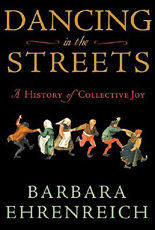"In the at least three-thousand-year-old struggle between Pentheus and Dionysus — between popes and dancing peasants, between Puritans and carnival-goers, between missionaries and the practitioners of indigenous ecstatic danced religions — Pentheus and his allies seem to have finally prevailed. Not only has the possibility of collective joy been largely marginalized to the storefront churches of the poor and the darkened clubs frequented by the young, but the very source of this joy — other people, including strangers — no longer holds much appeal. In today's world, other people have become an obstacle to our individual pursuits. They impede our progress on urban streets and highways; they compete for parking spots and jobs; they drive up the price of housing and 'ruin' our favorite vacation spots with their crass enjoyments and noisy presence; they may even be criminals or terrorists. We have evolved to be highly social animals and, more so than any other primate, capable of pleasurable bonding with people unrelated to ourselves. But on a planet populated by more than 6 billion of our fellow humans, all ultimately competing for the same dwindling supplies of land and oil and water, this innate sociality seems out of place, naive, and anachronistic.
"There is no powerful faction in our divided world committed to upholding the glories of the feast and dance. The Protestant fundamentalism of the United States and the Islamic radicalism of the Middle and Far East are both profoundly hostile to the ecstatic undertaking. Radical Islam cut its teeth on the suppression of ecstatic Sufism; it opposes music, dancing, and the public mixing of the sexes. American evangelical Protestantism may have its 'born-again' moments of individual religious revelation, but it is, by and large, a cold and Calvinist business — urging hard work, sobriety, and meager forms of charity. As for the secular viewpoint represented by the scholars and intellectuals of the West, we have encountered their visceral disdain for the 'primitive' excitement of the crowd throughout this book. Even communism, which might have been expected to celebrate human sociality, turned out — with the arguable exception of Cuba — to be a drab and joyless state of affairs, in which, as in the capitalist West, mass spectacles and military parades replaced long-standing festive traditions."
